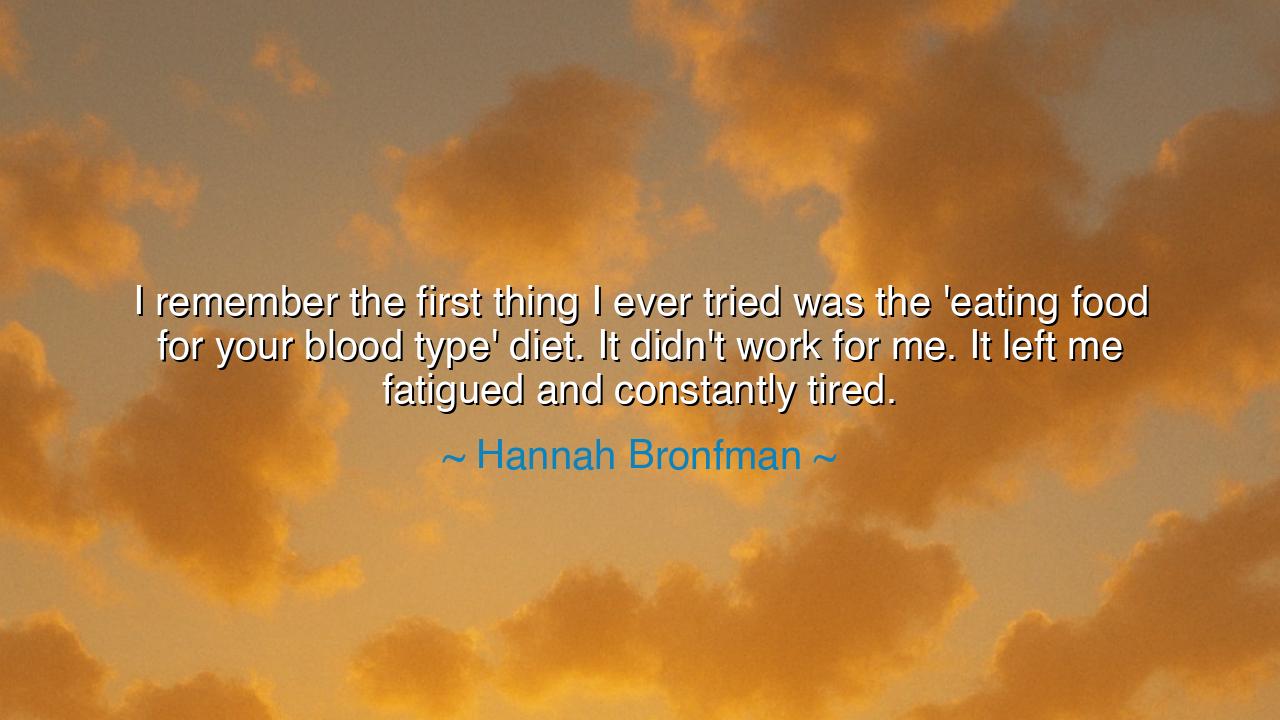
I remember the first thing I ever tried was the 'eating food for
I remember the first thing I ever tried was the 'eating food for your blood type' diet. It didn't work for me. It left me fatigued and constantly tired.






“I remember the first thing I ever tried was the ‘eating food for your blood type’ diet. It didn’t work for me. It left me fatigued and constantly tired.” — thus spoke Hannah Bronfman, a seeker of health and balance, whose journey through the maze of modern wellness revealed a truth older than any trend: that the body cannot be healed through imitation, but only through understanding. Her words, though simple, are an awakening — a reminder that wisdom does not come from the latest doctrine, but from listening to one’s own nature. For even in the age of science and information, many still forget the oldest of all truths: that each body is its own universe, and what nourishes one may poison another.
The diet for blood type was born from the desire to simplify the mystery of health — to divide the vast complexity of human life into four categories, each ruled by its blood, as though the secret of vitality could be written in red. Yet, as Bronfman discovered, such systems, though alluring in promise, often forget the subtle music of individuality. To follow them blindly is to walk in another’s footsteps while ignoring the rhythm of one’s own heartbeat. When she speaks of fatigue, she speaks of more than physical exhaustion — she describes the weariness that comes from disconnection, the soul’s protest when we live by rules not meant for us.
In her experience, there lies a universal struggle. Humanity, through every age, has sought the perfect formula — the elixir of youth, the one diet, the one belief, the one truth that could serve all. But this pursuit, though noble, often leads to bondage, not freedom. The ancient physicians of Greece understood this well. Hippocrates, father of medicine, taught that the key to health was not prescription but observation. “Observe the patient,” he said, “not the disease.” In other words, healing begins not from dogma but from listening — to the body’s voice, to the signs of balance and imbalance that nature whispers within us.
Bronfman’s fatigue was the body’s rebellion against rigidity. In seeking health through formula, she found depletion. This mirrors the fate of Emperor Qin Shi Huang, who once sought immortality through alchemy, consuming “elixirs of eternal life” made from mercury and gold. His desire for perfection became his undoing. What both stories reveal is that health cannot be forced, nor can vitality be achieved through obedience to myth. The body is not an enemy to be conquered, but a teacher to be heeded. When its voice is ignored, it grows silent — and in that silence, illness is born.
Her words also remind us of a deeper wisdom — that fatigue is not always a curse, but a message. It tells us that something within is out of harmony. Modern life, filled with noise, distraction, and endless advice, often severs our connection to intuition. We chase systems and idols — new diets, new fads, new “superfoods” — while forgetting that the truest healer lives within us. To be constantly tired, as she describes, is to wander too long in pursuit of others’ truths instead of resting in our own.
The origin of Bronfman’s realization lies not in defeat, but in awakening. When she saw that the “blood type” path brought no renewal, she began to understand that health is personal, not universal. The body is a sacred text, written in a language unique to each soul. No external authority can fully translate it. This is the wisdom that ancient healers, monks, and yogis all shared: that the road to balance begins inward. To know oneself — one’s rhythms, one’s hungers, one’s boundaries — is to hold the key to wholeness.
Let this be the lesson, O listener and seeker of well-being: beware the promise of systems that claim to know you better than you know yourself. No book, no diet, no expert can feel what your heart feels or hear what your body whispers. Experiment, yes — but let curiosity be guided by intuition, not by fear. When fatigue arises, listen. When strength blooms, observe. Learn not just from doctrine, but from the dialogue between your mind and your flesh. For the body, when honored, will tell you all it needs to thrive.
So, follow the path of balance, not bondage. Trust the wisdom of your own experience. Eat what brings life to your body, move as your spirit desires, rest when your soul demands peace. For, as Hannah Bronfman discovered, no diet, however acclaimed, can substitute for self-knowledge. The truest nourishment is found not in formula, but in harmony — the union of body, mind, and heart. Listen well, and your own nature will reveal the way.






AAdministratorAdministrator
Welcome, honored guests. Please leave a comment, we will respond soon